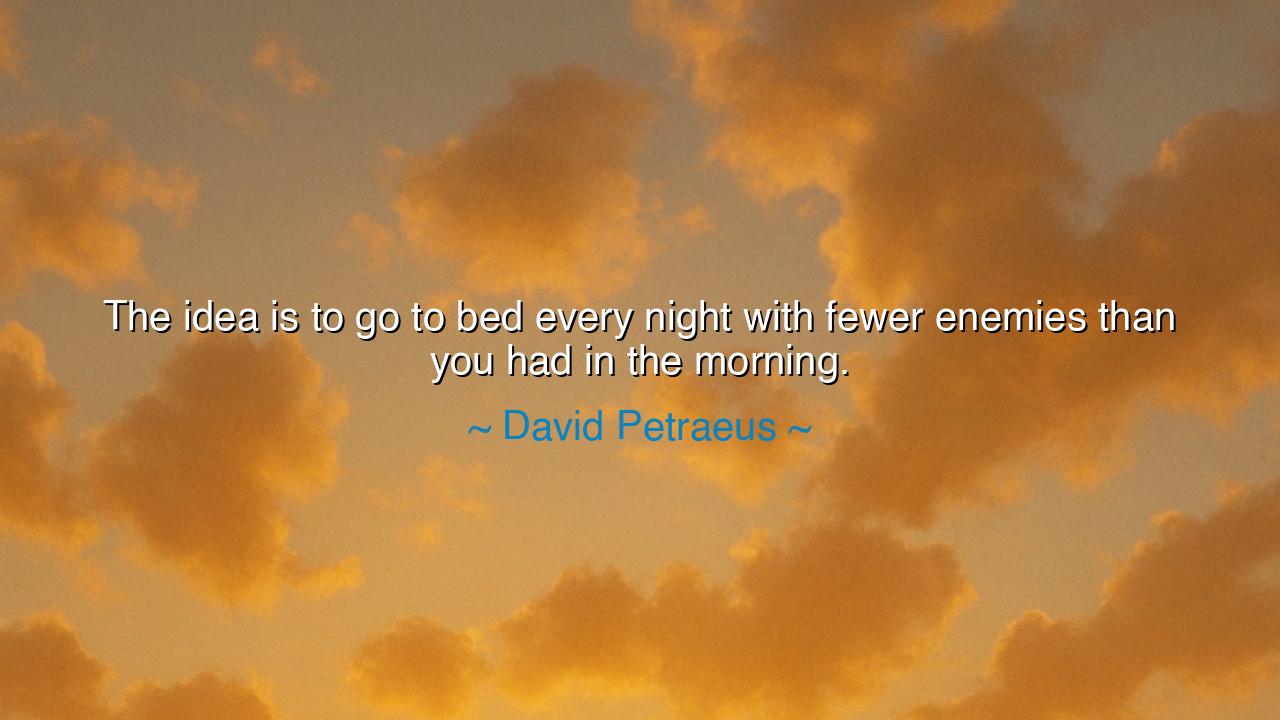
The idea is to go to bed every night with fewer enemies than you






The words of David Petraeus carry the quiet weight of both soldier and statesman: “The idea is to go to bed every night with fewer enemies than you had in the morning.” This is no idle saying, but a philosophy born of battlefields, negotiations, and the endless task of making order out of chaos. He speaks not only to the military commander but to every human soul, for life itself is a series of conflicts — some waged with weapons, others with words, and still others within the chambers of our own hearts. To end each day with fewer enemies is to seek not endless conquest, but lasting peace.
The meaning is layered. At one level, Petraeus, as a general, understood that wars cannot be won by the sword alone. Villages secured, cities rebuilt, nations stabilized — these come not from the sheer defeat of enemies, but from transforming them into allies, or at least into those who no longer wish for your destruction. To reduce the count of enemies is not weakness; it is strategy of the highest order, for wars are costly, but friendship multiplies strength.
This wisdom echoes through history. Consider the example of Abraham Lincoln, who once said, “Do I not destroy my enemies when I make them my friends?” In the fires of the Civil War, he sought not only to win battles but to heal a fractured nation. He knew that even victory on the battlefield would be hollow if bitterness and enmity continued to fester. His goal, like Petraeus’s, was not the endless creation of foes, but the steady reduction of them — until there were none left to hate, only brothers and sisters bound again as one.
Even in ancient times, this truth was known. Alexander the Great conquered vast territories, but what gave endurance to his empire was not only his armies, but his efforts to blend cultures, to marry peoples, to transform conquered subjects into willing citizens. He understood that to rule, one must turn enemies into companions, and that no kingdom survives long if it is built solely on fear. The art of kingship, like the art of soldiering, lies as much in reconciliation as in victory.
For the individual, Petraeus’s words also carry a lesson for daily life. Each of us awakens to struggles — quarrels with family, rivalries at work, tensions with neighbors, even grudges we bear within ourselves. If we end the day still carrying those weights, we have gained nothing. But if, before the night descends, we have laid one quarrel to rest, forgiven one offense, or extended one hand of kindness, then our burden is lighter, our spirit freer, and our world less divided. To sleep with fewer enemies is to rise closer to peace.
The practical path is simple, though never easy. Each day, ask yourself: who have I turned from an enemy into a friend, or at least into one less hostile to me? Have I softened a heart with understanding, bridged a gap with humility, or healed a wound with forgiveness? These are the battles worth fighting. For enmity is poison, and reconciliation is medicine. Each enemy removed is one less shadow in the world, one less threat to peace, one less weight upon your soul.
So hear this teaching as if from the lips of the ancients: the greatest warrior is not the one who makes the most enemies fall, but the one who reduces the number of enemies in existence at all. Strive, then, not merely to win, but to reconcile; not merely to conquer, but to unite. For the world is weary of hatred, and the true glory of man is to bring each day to its close with less division than before. And in this way, the teaching of Petraeus becomes eternal: to live wisely is to fight for a tomorrow where there are no enemies left, only allies, companions, and fellow travelers on the road of life.






AAdministratorAdministrator
Welcome, honored guests. Please leave a comment, we will respond soon